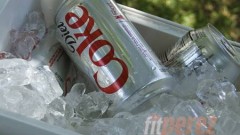If you are one of the millions of people who drink diet soda because you think it’s healthier or you think it’s lower in sugar then you need to listen up. It’s becoming clearer and clearer that diet sodas are worse for us than the regular, full sugared varieties.
Soda is not a healthy drink. Regular sodas contain high amounts of sugar, phosphoric acid and the dark ones contain the carcinogen caramel coloring. Nearly every dentist agrees that drinking soda increases the destruction of teeth.

Just one regular soda a day can lead to a 24 pound weight gain. For people who will are at risk for diabetes, this is about 40 g of sugars in your system without the benefit of any nutrients.
This is why people think that drinking diet soda is healthier. The lack of sugar means the risk of decaying our teeth goes away, the pounds will go away and the risk of diabetes goes down. That’s not the case. In fact, new studies are showing that people who drink diet soda put on more weight and the risk of diabetes increases.
Most diet sodas contain the chemical aspartame. Aspartame is a chemical that within the human body breaks down to formaldehyde. We all know formaldehyde from our high from school, mostly because it’s banned because it’s too toxic to be around children. Aspartame can cause liver damage and kidney damage.
Aspartame also stimulates the hormone cortisol, which is the hormone in our body that encourages fat storage. People drinking diet sodas for weight loss end up storing more fat than they lose. Since cortisol is also a stress hormone, people who drink diet sodas have an increased risk of stress related health problems such as heart disease, high blood pressure and certain psychological issues such as depression.
Perhaps the worst part about sodas is the caffeine. Caffeine is a stimulant drug. In small quantities, especially those that come from natural sources such as tea and chocolate, caffeine can help us work better, have clearer minds and reduce the risk of heart disease. Any more caffeine more than a half a can of soda or half a cup of coffee can throw off our body systems.
People who consume too much caffeine in the short-term develop jitteriness, inattentiveness, insomnia and skin problems like flushing. In the long term the excess caffeine can damage our brains, resembling Parkinson’s and Alzheimer’s diseases, increase high blood pressure and damage the liver. And let’s not forget that caffeine dehydrates the body. You actually need to drink twice the amount of water as soda in order to counteract the dehydrating affects caffeine has on your body.
Since the average teenager consumes 30 to 40 ounces of soda every day, nearly 10 times an acceptable level, we need to get the word out about just how bad these drinks are. As an occasional treat, no more than once a day, a small glass of soda is okay to drink. But any more than that and you’re not doing your body a favor. By Christina Major
